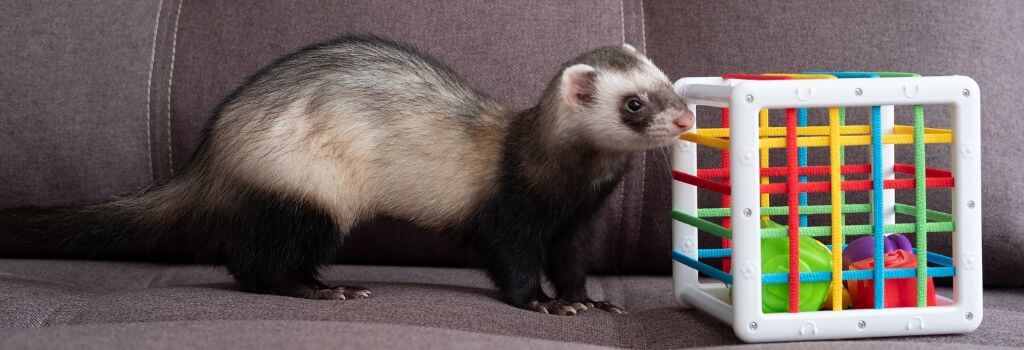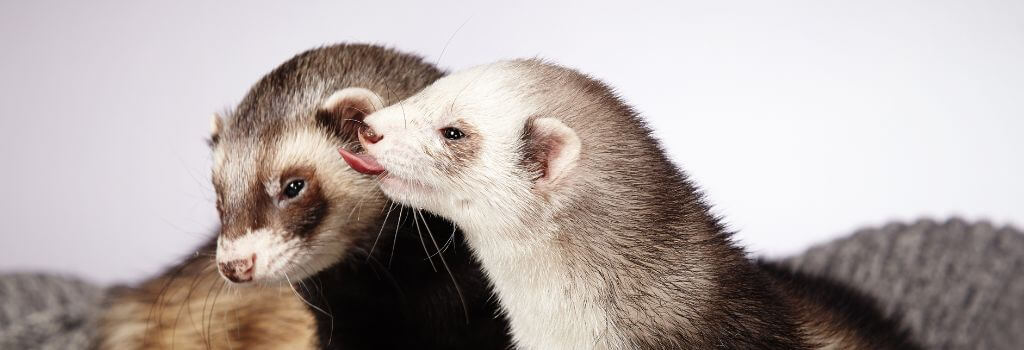If you’ve ever watched a ferret play, you know these spirited little creatures can turn an ordinary afternoon into pure entertainment. With their boundless energy, curious nature, and ability to squeeze into the most impossible spaces, ferrets have earned their reputation as some of the most mischievous and endearing pets around. But beneath their playful antics lies a fascinating world of behaviors and biological needs that might surprise even the most devoted ferret parent.
These slinky, tube-shaped companions pack more personality per pound than almost any other small pet, making them both delightful and challenging to care for. Whether you’re a longtime ferret owner or considering adding one to your family, understanding what makes these energetic creatures tick will help you provide the best possible care for your furry friend.
1. The “Weasel War Dance” — Nature’s Most Joyful Display
Picture this: your ferret suddenly arches their back, puffs their tail, and starts bouncing around like a furry ping-pong ball, often accompanied by excited chittering sounds. Don’t panic — your ferret hasn’t lost their mind! You’re witnessing the famous “weasel war dance,” one of the most endearing behaviors in the animal kingdom.
This exuberant display happens when ferrets experience pure joy or excitement. They might perform this dance after waking up from a nap, during play sessions, or when exploring new environments. The dance involves a series of sideways hops, spins, and arched-back bounces that may look alarming to first-time ferret owners but actually signal a happy, healthy pet.
Some ferrets are more theatrical dancers than others, with styles ranging from subtle hop-and-skip performances to full-blown acrobatic displays. Regular war dancing typically indicates good mental and physical health, and a sudden absence of this joyful behavior warrants a veterinary check-up.

2. Ferrets are Champions of Sleep, Getting 18 Hours of Daily Rest
Think cats are sleepy? Ferrets make them look like insomniacs! Surprisingly, these energetic pets sleep 18 to 20 hours a day, making them some of nature’s top nappers. Ferrets experience “dead sleep,” a deep slumber so profound that they can be difficult to wake. During these rest periods, their body temperature drops, their breathing slows, and they become remarkably limp and unresponsive. New ferret owners often panic, thinking their pet has become ill or worse, but this deep sleep state is normal.
Ferrets’ sleep schedule revolves around short bursts of intense activity followed by long recovery periods. When awake, ferrets operate at maximum energy levels, exploring, playing, and investigating everything within reach. Then they need substantial rest to recharge their batteries.
Many ferrets adapt to their human family’s schedule, becoming more active when their people are home and awake. But don’t expect your ferret to maintain a typical human sleep pattern. They’ll take multiple naps throughout the day regardless of your schedule.
Because of their extensive sleep needs, ferrets require comfortable, quiet spaces where they won’t be disturbed during their lengthy rest periods. Hammocks, cozy hideaways, and soft bedding materials provide the security they need for restful sleep.
3. Their Diet Matters More Than You Think
Ferrets are obligate carnivores, meaning they have to eat meat to survive. Their digestive systems have evolved specifically to process animal proteins and fats, rendering them unable to properly digest plant materials, fruits, or vegetables.
Ferrets digest food in just three to four hours and require frequent meals while awake. Their short intestinal tract and lack of cecum (the part of the digestive system that helps other animals process plant matter) make them wholly dependent on animal-based nutrition.
High-quality ferret foods contain at least 35-40% protein and 15-20% fat, with minimal carbohydrates. Despite marketing claims, cat food often fails to meet ferrets’ nutritional needs due to insufficient protein and excessive plant-based ingredients.
Fruits, vegetables, dairy products, and sugary treats can cause serious digestive upset and, over time, may contribute to pancreatic tumors due to blood sugar spikes. Even small amounts of inappropriate foods can impact their health, so avoiding them is essential.
4. Ferrets Live Up to 10 Years and Have Evolving Health Needs
Ferrets typically live 7 to 10 years, and their health needs change significantly as they age. Understanding common health concerns helps owners provide proactive care and catch problems early when treatment is most effective.
Adrenal disease affects up to 70% of ferrets, causing hair loss, increased aggression, and difficulty urinating. This condition results from overstimulated adrenal glands and often requires surgical intervention or medical management.
Insulinomas, tumors affecting the pancreas, are another common concern in middle-aged and older ferrets. They cause dangerous drops in blood sugar, leading to weakness, confusion, and potential seizures. Dietary management and, in some cases, surgery can help manage this condition.
Ferrets are prone to foreign body obstructions due to their tendency to chew and swallow inappropriate items. Rubber toys, foam padding, and small objects pose significant dangers. Emergency surgery is often required to remove these blockages.
Ferrets also require dental care throughout their life because their sharp, pointed teeth often develop tartar and gum disease without proper care. Regular veterinary dental cleanings and appropriate chew items help maintain oral health.
Regular veterinary checkups become increasingly important as ferrets age, with twice-yearly visits recommended for pets over four years old. Early detection and intervention significantly improves outcomes for many ferret health conditions.

5. Two Ferrets Are Better Than One
Despite their independent hunting ancestry, domestic ferrets are remarkably social creatures. A single ferret can certainly live happily with adequate human interaction, but many behaviorists and ferret experts recommend keeping pairs or small groups when possible.
Ferrets engage in social play that includes wrestling, chasing, and mock fighting. These interactions provide mental stimulation and physical exercise that human companions can’t fully replicate. The social benefits go beyond play, though. Ferrets groom each other, provide comfort during illness, and can even help shy or anxious ferrets gain confidence. A well-bonded pair will eat together, explore together, and often mirror each other’s behaviors.
However, introducing ferrets takes patience and care. Not all ferrets automatically accept new companions, and rushing the process can create lasting antagonism. Gradual introductions, supervised interactions, and separate spaces initially help ensure a successful bonding process.
Schedule an Appointment with Your Veterinarian Today
Ferrets bring incredible joy and entertainment to their families, but their unique needs require expert veterinary care. Whether you’re planning to add a ferret to your family or want to ensure your current companion receives the best possible care, your veterinarian is an invaluable resource. From nutritional guidance to preventive health screenings, they understand what these special pets need to thrive. Contact your vet today to schedule an appointment and give your ferret the professional veterinary care they deserve!
Don't have a vet in your area yet? We can help you find a local veterinarian.
If you have more questions, the GeniusVets Teletriage platform will give you unlimited access to text and/or video calls with board-certified veterinarians! To learn more click here.
